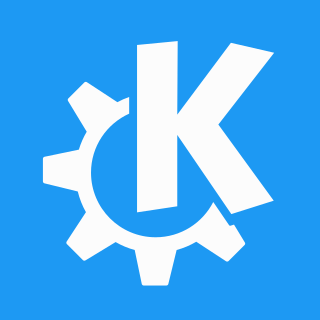 W
WKDE is an international free software community that develops free and open-source software. As a central development hub, it provides tools and resources that allow collaborative work on this kind of software. Well-known products include the Plasma Desktop, Frameworks and a range of cross-platform applications like Krita or digiKam designed to run on Unix and Unix-like desktops, Microsoft Windows and Android.
 W
WAkademy is an annual contributors and users conference of the KDE community. Akademy is held at varying venues in Europe.
 W
WAvahi is a free zero-configuration networking (zeroconf) implementation, including a system for multicast DNS/DNS-SD service discovery. It is licensed under the GNU Lesser General Public License (LGPL).
 W
WBackTrack was a Linux distribution that focused on security, based on the Knoppix Linux distribution aimed at digital forensics and penetration testing use. In March 2013, the Offensive Security team rebuilt BackTrack around the Debian distribution and released it under the name Kali Linux.
 W
WBeleniX is a discontinued operating system distribution built using the OpenSolaris source base. It can be used as a Live CD as well as installed to a hard disk. Initially developed as a Live CD along the lines of Knoppix to showcase OpenSolaris technologies, Belenix went on to become the initial base for Sun's OpenSolaris distribution. A number of technologies pioneered in the Belenix project have gone on to become full projects in their own right within the OpenSolaris ecosystem.
 W
WBluecurve is a desktop theme for GNOME and KDE created by the Red Hat Artwork project. The main aim of Bluecurve was to create a consistent look throughout the Linux environment, and provide support for various Freedesktop.org desktop standards. It has been used in Red Hat Linux since version 8.0, and Fedora Core.
 W
WChakra is a Linux distribution originally based on Arch Linux and focused on KDE software, intending to provide a KDE/Qt minimizing use of other widget toolkits where possible. It has been well-received by critics.
 W
WEveraldo Coelho is a Brazilian graphic designer and illustrator. He specializes in iconography, themes and user interface design. Everaldo's works include general illustrations, comics, children's books, corporate design and many other areas. He is known in Linux circles for his "Crystal" icon theme.
 W
WDesktopBSD is a Unix-derivative, desktop-oriented operating system based on FreeBSD. Its goal is to combine the stability of FreeBSD with the ease-of-use of K Desktop Environment 3, which is the default graphical user interface.
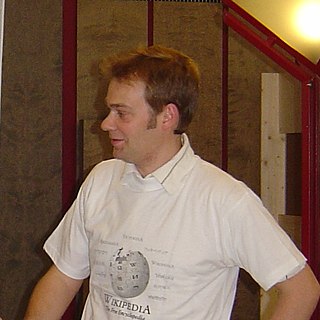 W
WMatthias Ettrich is a German computer scientist and founder of the KDE and LyX projects.
 W
WFilelight is a KDE graphical disk usage analyzer, part of the KDE Utils package, which uses the sunburst chart technique to display disk usage. Instead of showing a tree view of the files within a partition or directory, or even a columns-represent-directories view like xdiskusage, it shows a series of concentric pie charts representing the various directories within the requested partition or directory and the amount of space they use. A user may also click on the pie chart segment representing a particular directory, and repeat the analysis for that directory, right click that segment to open a file manager or terminal emulator in that location, or copy to clipboard or delete the directory, and they may right click the segment representing a file to open it, copy it to the clipboard, or delete it.
 W
WFrugalware Linux has been a general-purpose Linux distribution designed for intermediate users who are familiar with command-line operations. Early versions were based on Slackware, but it later became an independently developed distribution. Frugalware made use of the Pacman package management system from Arch Linux.
 W
WGCompris is a software suite comprising educational entertainment software for children aged 2 to 10. GCompris was originally written in C and Python using the GTK+ widget toolkit, but a rewrite in C++ and QML using the Qt widget toolkit has been undertaken since early 2014. GCompris is free and open-source software and the current version is subject to the requirements of the AGPL-3.0-only license. It has been part of the GNU project.
 W
WAdriaan de Groot is a researcher in software quality and formal verification. He has lived in Nijmegen, Netherlands since 1990. He is a KDE developer, member of KDE e.V. board and coordinator of KDE Netherlands.
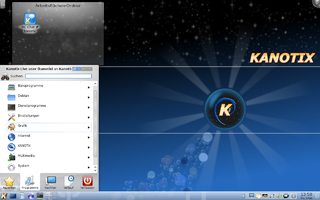 W
WKanotix, also referred to as KANOTIX, is an operating system based on Debian, with advanced hardware detection. It can run from an optical disc drive or other media i.e. USB-stick without using a hard disk drive.
 W
WFrank Karlitschek is a German open source software developer living in Stuttgart, Germany.
 W
WKDE.News is the official news website for the KDE free software community. It includes KDE development and user news, discussions, and feature articles. Most stories are summaries of things published elsewhere; some are interviews with KDE developers. The site also includes links to recent software releases and developers' weblog postings.
 W
WKDE e.V. is a registered non-profit organization that represents the KDE community in the legal and financial entities. The association supports KDE’s work in cash, hardware, and other donations, and then the use of donations to help the KDE development, but not influence on development. "e.V." stands for "eingetragener Verein" which means "registered association". The three flags on top of the KDE e.V. logo represent the three main tasks of the KDE e.V.: supporting the community, representing the community, and governing the community.
 W
WKDE neon is a GNU/Linux distribution developed by KDE based on the most recent Ubuntu long-term support (LTS) release, bundled with a set of additional software repositories containing the latest 64-bit versions of the Plasma 5 desktop environment/framework, Qt 5 toolkit and other compatible KDE software. First announced in June 2016 by Kubuntu founder Jonathan Riddell following his departure from Canonical Ltd., it has been adopted by a steadily growing number of Linux users, regularly appearing in the Top 20 on DistroWatch.com's popularity tables.
 W
WKmPlot is a mathematical function plotter for the KDE Desktop. It has a powerful built-in parser. The graphs can be colorized and the view is scalable, so that you are able to zoom to the level you need. Users can plot different functions simultaneously and combine them to build new functions. It also provides some numerical and visual features like:Filling and calculating the area between the plot and the first axis Finding maximum and minimum values Changing function parameters dynamically Plotting derivatives and integral functions.
 W
WKongoni is a Linux distribution that used the free version of the Linux kernel as distributed by the Linux-libre project. Development of the Kongoni project is currently dormant.
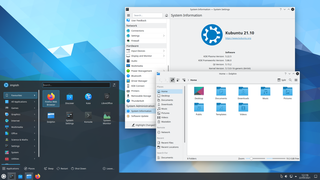 W
WKubuntu is an official flavor of the Ubuntu operating system that uses the KDE Plasma Desktop instead of the GNOME desktop environment. As part of the Ubuntu project, Kubuntu uses the same underlying systems. Every package in Kubuntu shares the same repositories as Ubuntu, and it is released regularly on the same schedule as Ubuntu.
 W
WMageia is a Linux-based operating system, distributed as free and open source software. It was forked from the Mandriva Linux distribution. The Greek term mageía (μαγεία) means enchantment, fascination, glamour, wizardry.
 W
WMandriva Linux is a discontinued Linux distribution developed by Mandriva S.A.
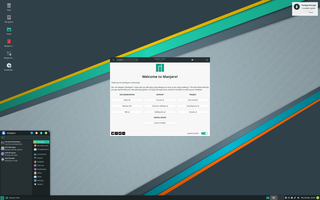 W
WManjaro is a free and open-source Linux distribution based on the Arch Linux operating system. Manjaro has a focus on user-friendliness and accessibility, and the system itself is designed to work fully "straight out of the box" with its variety of pre-installed software. It features a rolling release update model and uses Pacman as its package manager. Manjaro is mainly developed in Austria, France and Germany.
 W
WMEPIS was a set of Linux distributions, distributed as Live CDs or DVDs that could be installed onto a hard disk drive. MEPIS was started by Warren Woodford and the eponymous company MEPIS LLC.
 W
WNetrunner is a free operating system for desktop computers, laptops or netbooks, and arm-based device-types like the Odroid C1 microcomputer or the Pinebook.
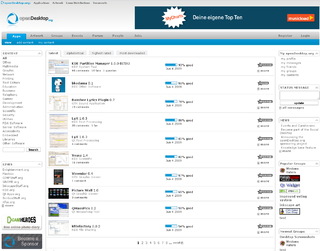 W
WopenDesktop.org is a libre website portal offering personal cloud services like storage and communication services, as well as public services in form of a store for libre content publishing and a code hosting site for open development.
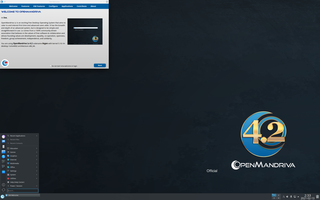 W
WOpenMandriva Lx is a Linux distribution forked from Mandriva Linux. It is published by the OpenMandriva Association.
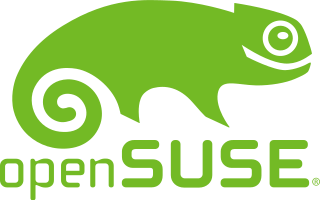 W
WopenSUSE is a project that serves to promote the use of free and open-source software.
 W
WThe Oxygen Project is a project created to give a visual refresh to KDE Plasma Workspaces.
 W
WPardus is a Linux distribution developed with support from the government of Turkey. Pardus' main focus is office-related work including use in Turkish government agencies. Despite that, Pardus ships in several languages. Its ease of use and availability free of charge has spawned numerous communities throughout the world.
 W
WPCLinuxOS, often shortened to PCLOS, is an x86-64 Linux distribution, with KDE Plasma Desktop, MATE and XFCE as its default user interfaces. It is a primarily free software operating system for personal computers aimed at ease of use. It is considered a rolling release.
 W
WPelicanHPC is an operating system based on Debian Live, which provides a rapid means of setting up a high performance computer cluster.
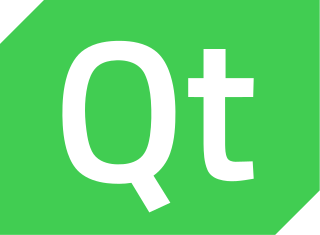 W
WQt is a widget toolkit for creating graphical user interfaces as well as cross-platform applications that run on various software and hardware platforms such as Linux, Windows, macOS, Android or embedded systems with little or no change in the underlying codebase while still being a native application with native capabilities and speed.
 W
WRed Flag Linux is a Linux distribution developed by Red Flag Software. The distribution logo is Tux carrying a prominent red flag. As of 2009, the executive president of Red Flag Software is Jia Dong (贾栋).
 W
WRed Star OS is a North Korean Linux distribution, with development first starting in 1998 at the Korea Computer Center (KCC). Prior to its release, computers in North Korea typically used Red Hat Linux and Windows XP.
 W
WROSA Linux is a Linux operating system distribution, developed by the Russian company 'LLC NTC IT ROSA'. It is available in three different editions: ROSA Desktop Fresh, ROSA Enterprise Desktop, and ROSA Enterprise Linux Server, with the latter two aiming at commercial users. Its desktop computer editions come bundled with closed-source software such as Adobe Flash Player, multimedia codecs, and Steam.
 W
WRosegarden is a free software digital audio workstation program developed for Linux with ALSA and Qt4. It acts as an audio and MIDI sequencer, scorewriter and musical composition and editing tool. It is intended to be a free alternative to such applications as Cubase.
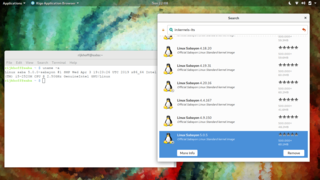 W
WSabayon Linux or Sabayon, is a Gentoo-based Italian Linux distribution created by Fabio Erculiani and the Sabayon development team. Sabayon follows the "out of the box" philosophy, aiming to give the user a wide number of applications ready to use and a self-configured operating system.
 W
WCornelius Schumacher is a German open source software developer. He was born in Tübingen but lives in Erlangen, Germany.
 W
WThe Trinity Desktop Environment (TDE) is a complete software desktop environment designed for Linux and Unix-like operating systems, intended for computer users preferring a traditional desktop model, and is free/libre software. Born as a fork of KDE 3.5 back in 2010, it was originally created by Timothy Pearson, who had coordinated Kubuntu remixes featuring KDE 3.5 after Kubuntu switched to KDE Plasma 4.
 W
WTrueOS is a discontinued Unix-like, server-oriented operating system built upon the most recent releases of FreeBSD-CURRENT.